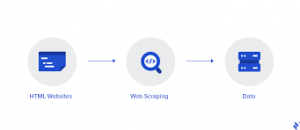How to Make Money with Web Scraping using Python in 3 Steps
Looking for how to make money with web scraping using Python. Recently, in the fast-evolving digital landscape, Python’s web scraping capabilities have transformed from a technical curiosity to a powerful asset, opening up diverse opportunities for individuals to monetize their coding skills. This simple guide aims to navigate you through the avenues of making money with web scraping using Python, emphasizing ethical considerations and legal responsibilities along the way.
What is web scraping in Python?
Web scraping in Python is the process of extracting data from websites. Using specialized libraries like BeautifulSoup and Requests, Python developers can navigate through the HTML structure of web pages, locate relevant information, and extract it for further analysis or storage. This technique automates the tedious task of manual data extraction, allowing for efficient gathering of data from diverse sources.

How to web scraping with Python:
Web scraping with Python involves extracting data from websites using specialized libraries. The primary tools include BeautifulSoup for parsing HTML and Requests for making HTTP requests. Here’s a basic guide:
- Install Necessary Libraries: Use pip to install BeautifulSoup and Requests.
pip install beautifulsoup4 requests
- Make HTTP Requests: Use the Requests library to fetch web pages.
import requestsParse HTML Content: Utilize BeautifulSoup to navigate and extract information from the HTML.
from bs4 import BeautifulSoupsoup = BeautifulSoup(response.text, ‘html.parser’)
Locate and Extract Data: Use BeautifulSoup to find and extract specific elements.
title = soup.title.textIterate and Scale: Implement loops and functions for scalability across multiple pages or websites.
How to automate web scraping using Python :
Automating web scraping with Python streamlines data extraction tasks. Employ the following steps:
1. Install Required Libraries: Use pip to install libraries like BeautifulSoup, Requests, and Selenium.
pip install beautifulsoup4 requests selenium
2. Set Up Selenium WebDriver: If using Selenium, download the appropriate WebDriver for your browser and set its path.
3. Write the Script: Use Python scripts to automate the scraping process. Leverage the requests library for basic scraping or Selenium for dynamic content.
from bs4 import BeautifulSoup
import requests
url = ‘https://example.com’
response = requests.get(url)
soup = BeautifulSoup(response.text, ‘html.parser’)
4. Use Selenium for Dynamic Content: For pages with dynamic elements, employ Selenium to interact with the page.
from selenium import webdriver
driver = webdriver.Chrome()
driver.get(‘https://example.com’)
5. Implement Loops and Conditions: Design scripts with loops and conditions for iterative or conditional scraping.
6. Schedule with Cron or Task Scheduler: Schedule your script to run at specific intervals using Cron on Unix-like systems or Task Scheduler on Windows. Web scraping finds applications in various fields, from data analysis and market research to competitive intelligence. However, it’s crucial to adhere to ethical standards and respect website terms of service while engaging in web scraping activities.
The Rise of Web Scraping as a Marketable Skill
The data-centric nature of contemporary industries has propelled web scraping into a highly sought-after skill. As businesses and organizations increasingly rely on data-driven insights, professionals proficient in web scraping are in high demand. This shift highlights the importance of understanding not only how to scrape data but also how to leverage this skill for financial gain.
Web scraping using Python has ascended from a niche tech skill to a highly marketable asset, defining a new era of digital proficiency. In an increasingly data-centric world, the ability to extract, analyze, and interpret information from the web has become a sought-after expertise.
As businesses and industries recognize the power of data-driven insights, professionals proficient in web scraping, particularly with Python, find themselves in high demand. This blog explores the evolution of web scraping into a lucrative skill, outlining how individuals can capitalize on this trend to advance their careers, freelance, or even launch entrepreneurial ventures. It’s a journey into the heart of the data-driven future.
Overview of How Web Scraping Can Generate Income

Web scraping offers a multitude of income-generating opportunities. This section explores various avenues, from freelancing and consulting to developing custom tools, creating and selling data products, affiliate marketing, and establishing subscription-based services. The versatility of web scraping allows individuals to tailor their approach to their expertise and preferences.
Identifying Profitable Niches for Web Scraping
A critical aspect of successful web scraping monetization is the identification of lucrative niches. E-commerce price monitoring, market research, lead generation, and content aggregation are examined as prime examples. Understanding the specific needs and pain points within these niches is essential for offering valuable and marketable services.
Building a Portfolio of Web Scraping Projects
Crafting a compelling portfolio is crucial for showcasing your skills to potential clients and employers. This section explores the importance of selecting niche-specific projects, sharing your work on platforms like GitHub, and creating a personal website or blog for portfolio display. A robust portfolio not only serves as a testament to your capabilities but also as a marketing tool.
Freelancing and Consulting Opportunities
Platforms like Upwork, Freelancer, and Fiverr provide a gateway to freelancing opportunities. This section delves into crafting effective proposals, bidding strategies, and managing client relationships. Freelancing allows individuals to apply their web scraping skills to a variety of projects while gaining valuable experience and building a reputation in the industry.
Developing and Selling Custom Web Scraping Tools
Identifying common pain points within industries can lead to the development of custom solutions. This section explores the process of building scalable and custom tools and strategies for marketing and selling them. Developing and selling tools can provide a passive income stream and position you as an industry expert.
Creating and Selling Data Products
Analyzing data trends and packaging insights into marketable products is a lucrative avenue for monetizing web scraping skills. This section guides you through the process of creating, packaging and marketing data products on online platforms. Selling data products allows you to capitalize on your expertise and provide valuable information to businesses and individuals.
Monetizing Web Scraping Through Affiliate Marketing:

Web scraping can be integrated into affiliate marketing strategies, particularly in extracting and aggregating product data. This section explores how to incorporate affiliate links into scraped content, analyze performance, and optimize strategies. Affiliate marketing can provide a commission-based income stream by leveraging the data gathered through web scraping.
Establishing Subscription-Based Services
For a steady and recurring income, offering subscription-based services is explored in this section. Providing premium data access, regularly updated insights, and other valuable services on a subscription model can build a consistent revenue stream. This approach is particularly effective for individuals with ongoing data needs in specific niches.
Ad Revenue from Scraped Content
Creating niche-specific content websites and monetizing through ad networks is another viable option. This section explores the balance between user experience and ad revenue and provides insights into maximizing profits through targeted content creation and strategic ad placements.
Legal and Ethical Considerations
A crucial aspect of web scraping is navigating the legal and ethical landscape. Respecting terms of service, privacy policies, avoiding unauthorized access, and staying informed about data protection laws are discussed in detail. Adhering to ethical and legal guidelines not only ensures compliance but also safeguards your reputation and long-term success.
Overcoming Challenges and Staying Competitive
Web scraping is not without its challenges, and staying competitive requires adaptability. This section discusses strategies for overcoming common issues, implementing robust error handling, and staying updated with industry trends. Continuous learning and innovation are emphasized as key factors for success in this dynamic field.
How to Make Money With Web Scraping Using Python:
Once you have your programs set up and have learned a little bit of coding, utilizing Python with proxies to make money online can be one of the simpler ways to generate money with web scraping using Python. You can freely use a large portion of the code that has previously been created in the programs you might create. Change this paragraph
Reselling proxies:
You could utilize a Rayobyte API to resell proxies on your website. With direct software integration, this will serve as your delivery system, giving you total control and making it simple to manage your proxies.
After setting up Python-based web scraping, identify potential clients—individuals seeking IP protection or businesses evading anti-bot measures. Market your proxies on your website, bolstered by informative content and testimonials for credibility. Utilize Raybyte’s user-friendly API to seamlessly sell proxies, establishing a lucrative avenue for earning through web scraping with Python.
Selling data:
Web scraping using Python organizing the data you find, and then selling that data is another way to generate money with web scraping in Python. Some businesses might be interested in the data you scraped but lack the time or funds to create programs and learn how to do it. Where you can benefit them is there.
Selling data to companies (the most obvious way)
Many businesses nowadays depend on data to drive their operations and conduct research to stay one step ahead of their rivals.
The good news is that statistics are available on the internet in abundance. There is one small issue, though: the majority of that public data is unorganized. That is, the data isn’t arranged in a pre-defined way; as a result, you’d find this unstructured data in emails, social media posts, videos, photographs, etc. rather than in a nice-looking Excel spreadsheet.
Conclusion:
Web scraping using Python is a rewarding and entertaining way to make money online through web scraping with Python and proxy selling. If you’re still unsure about how to use Python to make money from web scraping, read on. The solution is that you can start web scraping hundreds of public websites for useful data collecting by using Python tools, having some basic coding skills, and using residential proxies. You can resell proxies you’ve got for extra money or use the data you’ve scraped for profitable purposes.
See Also:
- Unveiling the Distinctions: Web Crawler vs Web Scrapers
- How to Make Money with Web Scraping Using Python
- How to Type Cast in Python with the Best 5 Examples
- Best Variable Arguments in Python
- 5 Best AI Prompt Engineering Certifications Free
- 5 Beginner Tips for Solving Python Coding Challenges
- Exploring Python Web Development Example Code
- “Python Coding Challenges: Exercises for Success”





